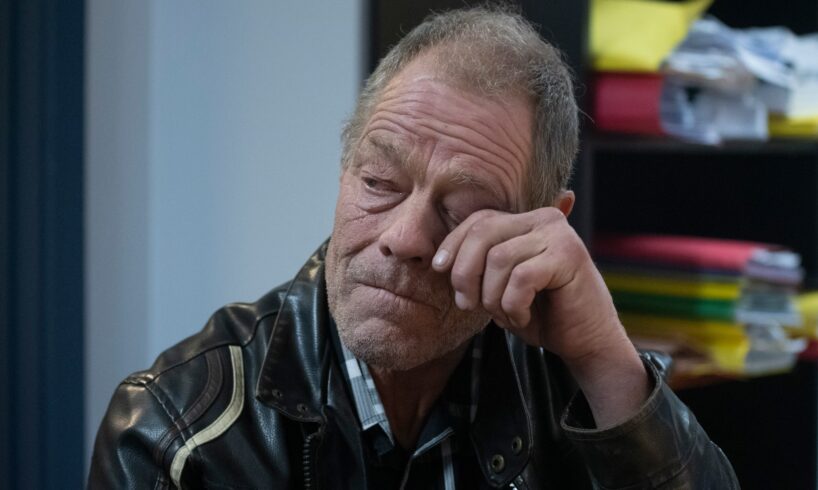
Open this photo in gallery:
Timothy Rees wipes away tears while speaking to the media after his murder conviction was quashed on Thursday.Fred Lum/The Globe and Mail
Thirty-five years after Timothy Rees was found guilty of murdering a 10-year-old girl, the Ontario Court of Appeal has quashed his conviction, ruling that a miscarriage of justice occurred in the case.
In its decision Thursday, the court concluded that Mr. Rees did not get a fair trial back in 1990, because important evidence – a tape recording of a conversation between police and a viable alternate suspect – was withheld from his defence team by police.
The panel of three judges said it will now be up to the Crown to decide whether to test the charges against Mr. Rees in a new trial.
Mr. Rees, now 62, broke down in tears after receiving the judgment at his lawyer’s office in Toronto on Thursday morning. He was “just grateful,” he said.
“Being labelled a murderer when I’m not … as of today, that elephant’s been lifted off my back,” he said.
A spokeswoman for the Ministry of the Attorney General, Alexandra Wilkes, declined to comment on the decision, saying the matter is before the courts.
Mr. Rees was convicted of second-degree murder for the 1989 killing of 10-year-old Darla Thurrott. The then-25-year-old had been crashing at Darla’s home after a night of drinking and drugs with her parents, when she was found lifeless and strangled in her bed.
Mr. Rees was sentenced to life in prison with no possibility of parole for 15 years, ultimately serving 23 before being granted full parole in 2013. His conviction was largely based on a confession that he has always maintained was coerced.
“Way back at that time, things were really bad, and I just agreed to whatever to let me be,” he said Thursday. “And that proved to be the biggest mistake of my life.”
Edmonton man whose murder conviction was quashed has been granted bail
‘Tunnel vision’ of police blamed for wrongful conviction of two New Brunswick men
Mr. Rees made an appeal to the Court of Appeal for Ontario in 1994, but that was dismissed. He was also denied a hearing by the Supreme Court of Canada.
In 1999, he wrote to what is now known as Innocence Canada – a non-profit organization that advocates for people wrongly convicted of a crime – asking them to review his conviction.
Lawyer Heather Pringle (now a judge with the Ontario Court of Justice) initially took on the case and requested full disclosure of the case files from the Toronto Police Service. Among the materials handed over was a previously undisclosed cassette tape recording of an interview between a junior constable and another man who was in the house that night: the family’s live-in landlord, James Raymer, whose bedroom was across the hall from Darla’s.
In that conversation – which occurred the day after the murder – Mr. Raymer made what Mr. Rees’s appeal lawyer James Lockyer argued were incriminating and even pedophilic comments about his inappropriate relationship with Darla, including that he interacted with the girl at least twice the night she was killed and kissed her goodnight. At trial, where Mr. Raymer testified as a prosecution witness, he denied even having seen her.
Mr. Raymer died in 1999.
It’s unclear who was aware of the tape’s existence within the police force. During the appeal hearing, court heard the junior constable in the recording say he has no memory of the conversation. The case’s lead investigators similarly said they’d never heard the tape, and had no idea it existed.
In an e-mail Thursday, Toronto Police spokesperson Stephanie Sayer said, “We respect the Court of Appeal’s decision.” She added that “it would be inappropriate to comment further,” given that the case is before the courts.
The appeal court heard police had written off Mr. Raymer as a suspect because he had developmental and physical disabilities, which they argued would have made it difficult for him to have strangled the girl.
But had Mr. Raymer’s comments been properly disclosed to the Crown, it is doubtful Mr. Rees would have been charged, never mind convicted, argued Mr. Lockyer, a co-founder of Innocence Canada.
Open this photo in gallery:
It is doubtful Rees would have been charged, never mind convicted, if all the evidence had been properly disclosed at the time, said lawyer James Lockyer, a co-founder of Innocence Canada.Fred Lum/The Globe and Mail
Crown lawyers disputed the strength of the evidence on the tape, which they characterized as confusing, and argued that even with this new evidence their case against Mr. Rees remained strong. Nonetheless, they acknowledged the tape should have been disclosed.
The appeal court agreed.
“There was a miscarriage of justice in this case,” the judges’ decision reads. “The conviction is set aside. A new trial is ordered.”
It will now be up to the Crown to decide whether to proceed with a new trial against him, though the appeal court decision notes the Crown has indicated that is unlikely.
Mr. Lockyer said Thursday that he would be in touch with the Crown’s office to discuss their intended next steps.
“What’s important for today’s purposes is he’s now free of that murder conviction,” he said.
On Thursday, Mr. Rees said he hopes for the chance to formally clear his name.
“In the end, I’m going to prove my case. … I already have,” he said. “I’ll get to the acquittal that I deserve.”
“Since 1989 I’ve been labelled a killer and I’m not,” he said, breaking into tears. “I’m happy … I’m no longer labelled that way.”
He said it has been hard living with this, even after being released on parole.
“I’ve been fired from jobs because of this,” he said. “I did not kill Darla. I am innocent, and it had nothing to do with me.”
Mr. Lockyer said in an interview Thursday that it was “a fluke” the recording – on an unmarked cassette tape, one of dozens found in a box of other evidence – was even discovered.
“A real piece of good luck enabled Tim Rees to get his case back into the courts so he could say he was innocent,” he said. “Setting aside wrongful convictions for murder shouldn’t have to depend on luck. But it did.”
New wrongful conviction review body could see hundreds of applications
In 2024, the federal government established the Miscarriage of Justice Review Commission, to review, investigate and decide which criminal cases should be returned to the justice system owing to potential miscarriages of justice.
Mr. Lockyer anticipates it will unearth many other cases like Mr. Rees’s.
“We think that that is going to expose a much greater number of wrongful convictions than we’ve seen exposed in the last 20 odd years,” he said.





